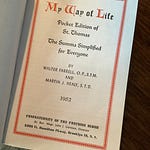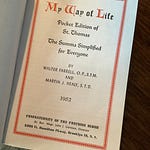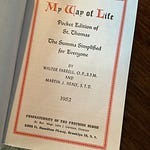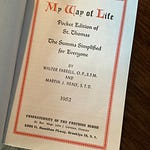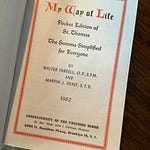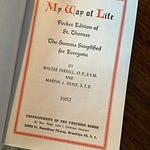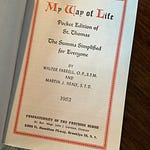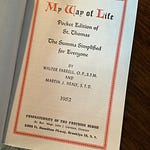For readers who want to read along:
Sept. 29, 1958 - Cooper v. Aaron, 358 US 1
Related Bailiwick reporting and analysis:
Oct. 17, 2023 - Texas and Oklahoma v. US Department of Health and Human Services and Xavier Becerra: case documents
Oct. 18, 2023 - There is never going to be another "deadly global pandemic." There have not been any in the past.
Nov. 13, 2023 - Opportunities for US state lawmakers to shield their populations from the next 'public health emergency'-predicated federal assaults through repeal of Model State Emergency Health Powers Act (MSEHPA) laws at the state level.
Nov. 30, 2023 - Model Restoring State Sovereignty Through Nullification Act: Tennessee HB726
Dec. 6, 2023 - Litigation proposals for state Attorneys General.
Dec. 20, 2023 - Ending National Suicide Act. Draft bill for 118th Congress to repeal seven of the main kill box enabling acts.
Examples of US states filing joint challenges to unjust federal acts:
July 18, 2022 - Petition for HHS rulemaking to amend definition of ‘public health emergency’ filed by AGs of Oklahoma, Alabama, Arizona, Arkansas, Florida, Georgia, Indiana, Louisiana, Mississippi, Missouri, Montana, Nebraska, South Carolina, Texas, and Utah.
Nov. 17, 2022 - Petition for withdrawal of HHS Interim Final Rule ‘Omnibus Health Care Staff Vaccination,’ filed by AGs of Montana, Louisiana, Tennessee, Arizona, Alabama, Alaska, Arkansas, Florida, Indiana, Kansas, Kentucky, Mississippi, Missouri, Nebraska, New Hampshire, Ohio, Oklahoma, South Carolina, Texas, Utah, Virginia, and Wyoming
Notes: The first petition was denied by HHS by letter dated Oct. 31, 2022; two of the states (Oklahoma and Texas) filed a civil complaint in US District Court for Northern District of Texas in January 2023; and that case was dismissed Aug. 18, 2023. I have not located records regarding the disposition of the second petition, led by Montana AG Austin Knudsen. The failure of these two attempts doesn’t mean state governors and AGs can’t or shouldn’t work together to fight off the legalized, medicalized federal invasion of their states and killing of state citizens. It means the governors and AGs should draft and file better challenges: challenges that present the information fully and truthfully, without repeating and reinforcing lies and omissions used by federal government officials and their proxies.
Edited transcript of the commentary part (roughly first 30 minutes).
So today is January 4th, 2024. This is Katherine Watt, and I just finished recording the [1958] Supreme Court opinion in a case called Cooper v. Aaron, which was a follow-up case to the Brown v. Board of Education case.
Brown v. Board of Education was in 1954 and then schools began trying to implement the finding that it's unconstitutional under the 14th Amendment to have segregated public schools.
And then the governor and legislature in Arkansas interfered with the Little Rock Arkansas plan to integrate its public schools and then the case went to the Supreme Court and the Supreme Court unanimously affirmed its Brown v. Board of Education ruling and said that the desegregation process had to move forward even though the governor and the legislature of Arkansas objected to it.
I'm recording now some commentary on why I'm reading that particular case and how it relates to what's happening now in the United States.
I think that this commentary section will be about 20 minutes and then the actual reading of the case is about 50 minutes.
So, the reason why I took a closer look at Cooper v. Aaron is because a growing number of state lawmakers in the United States, mostly in Republican-dominated state legislatures, have been considering nullification acts under the 10th Amendment to the U.S. Constitution. [Tenth Amendment: The powers not delegated to the United States by the Constitution, nor prohibited by it to the States, are reserved to the States respectively, or to the people.]
They're considering bills in their state legislatures that would provide pathways or mechanisms for the state government to nullify federal acts, federal, whether they're executive orders by presidents or congressional statutes or regulations put out by administrative agencies.
We have seen — it has become clear through Covid that many of those executive orders and Congressional acts and administrative regulations are unconstitutional because basically they're just enabling laws that have enabled the US military to use public health proxies (pharmacists and nurses), and biochemical poisons labeled as medicinal treatments, to injure and kill people.
And as that becomes more obvious over time, more state lawmakers are looking at: What can we do to protect the people in our jurisdiction, the state that we live in, from the federal attacks that are coming in through this public health emergency, emergency use authorization, medical countermeasures, PREP Act liability immunity, this whole construct?
The federal laws that the states would be nullifying include at least seven Congressional laws that I recently wrote a draft repeal act for Congress to consider. And the same list can be adapted for states to use.
It doesn't cover — this list of seven does not cover all of the different pieces of the puzzle that have been put in place since 1944.
But if these seven were knocked out, the kill box system would not work anymore.
And I'm just going to list those.
42 U.S. Code Sections 264 to 272, which is the quarantine and inspections programs that originated in 1944.
42 USC 262 to 263, which is the licensing of biological products and clinical laboratories sections, also started in 1944 and amended many times thereafter.
So the, the nullification and the repeal acts would have to nullify or repeal the original sections and all of the amendments that have been built on top of those.
The third one is 50 U.S.C. Sections 1511 to 1528, which is the chemical and biological warfare program that began in 1969. And it was going on before that, but it began under that name in 1969.
42 U.S. Code Section 247d to 247d-12. That's the Public Health Emergencies program that started in 1983. And then the original 1983 one was repealed and replaced in 2000, but it's still the Public Health Emergencies program.
The [
fourthfifth] one is 42 USC sections 300aa-1 to 300aa-34. That's the National Vaccine program and the National Vaccine Injury Compensation program that both began in 1986.The next one is 21 U.S. Code Section 360bbb to 360bbb-8d. That's the Expanded Access to Unapproved Therapies and Diagnostics program, which started in 1997 and includes the Emergency Use Authorization program.
And then the last one in this list is 42 U.S.C. 300hh-1 to 300hh-37 and that's the National All Hazards Preparedness for Public Health Emergencies program that started in 2002 and that's where the — a lot of the power consolidation mechanisms are located in that one.
Just as a kind of a side note, in addition to nullifying these federal kill box laws that I just listed, it's important for state lawmakers to also repeal their own state level versions of the kill box laws. All 50 states and the District of Columbia have them on the books. Mostly they adopted them as versions of the Model State Emergency Health Powers Act, which was drafted by lawyers at Georgetown and Johns Hopkins in the late 1990s and early 2000s and then was pushed through state legislatures by the same military-industrial-Congressional-pharmaceutical complex lobbyists that pushed the federal kill box laws onto the books.
So this came up, this case of Cooper v. Aaron came up on a recent strategy call that I was on with a bunch of people, including state legislators from several different states.
And one of those lawmakers, said during the meeting that he has tried to interest several lawyers in the nullification process and trying to draft the state laws to set up the mechanisms to do nullification of federal kill box laws.
And that the response he's gotten from those lawyers is that it can't be done because of Cooper v. Aaron, because that case in 1958, apparently — I haven't talked to these lawyers. I don't know who they are. I don't know their names.
But what this state lawmaker said that they said to him is: Cooper v. Aaron is a Supreme Court precedent that prohibits state government acts of nullification of federal laws.
And the guy that was on the call rightly pointed out that the lawyers he's talking to somehow cannot make a distinction between constitutionally-sound federal laws and acts, which is the kind of laws and acts that were under review in Cooper v. Aaron in 1958, between those and unconstitutional federal laws and acts, which are the ones that are being committed under the, or the ones that have been adopted and then the programs that are being carried out under those laws through the Public Health Emergencies-EUA-Medical Countermeasures-PREP Act construct.
The Public Health Emergencies system is just a kill box. It is just an unconstitutional concentration of power, centralization of power, usurpation of power, overthrow of constitutional rule of law. The Public Health Emergencies program is a power grab.
It is not constitutionally sound.
So, Cooper v. Aaron, the 1958 case, stands for the principle that state governments and citizens are bound to comply with constitutionally sound acts of the federal government.
And they are especially bound to do that when the Supreme Court has, in fact, thoroughly reviewed the disputed federal laws or the disputed federal programs or the disputed state laws and programs, whatever, if the Supreme Court has actually looked at the evidence and heard the arguments and conducted its review.
And in the case of Cooper v. Aaron, it issued the ruling unanimously and Brown v. Board of Education was also unanimous.
They've interpreted them in light of the U.S. Constitution.
And they say, as you'll hear if you listen to the actual reading of the case, they make the point that the Supreme Court members, judges, are humans. They mess up too. There have been many times in American judicial history when prior cases are overturned by subsequent courts.
But their finding at any given time, if they have actually reviewed the facts of the case and the law in light of the U.S. Constitution, is binding.
Cooper v. Aaron does not stand for the principle that state governments and citizens have to comply with, or submit to, or withhold their defiance of, unconstitutional, or in the case of the COVID-19 programs, criminal acts of the federal government and its proxies.
And the failure of the lawyers that this guy, the state lawmaker has been talking to, to understand this, is all the more strange and egregious because no federal court has yet been presented with any case directly challenging the constitutionality of the public health emergency laws and the federal acts that have been carried out since 1944 and especially in the last four years to enable the mass killing program to operate.
The mass killing program has been enabled to operate because those laws shore up the lie that there's such a thing as deadly global pandemics of communicable diseases. And that under those circumstances, it's okay to concentrate all ruling power into the executive branch.
And it's okay for the government, the federal government to deploy biological weapons to kill people with impunity by working through public health proxies like pharmacists and nurses who have been given licenses to kill under PREP act declarations.
None of that has ever made it made it to any federal court. And so there is no obligation for states to defer to it. The states and the citizens in the states are actually duty-bound to defy and to nullify those unconstitutional and criminal federal acts.
So how and why have these issues not been presented to federal courts yet, even though four years have gone by?
There are at least two mechanisms.
There are probably more, but the two that I have located so far are the PREP Act, which was passed by Congress in December 2005, and included specific provisions that claim to prohibit judicial review and claim to prohibit state, tribal and local authority to defy the Health and Human Services Secretary's decrees or edicts or dictates, whatever you want to call what he's doing as the single person who controls the response to the events he describes as a public health emergency.
And that same PREP Act also limited Congressional function to receipt of occasional reports from HHS. It does not articulate any Congressional oversight function.
So the three, three specific sections are 42 U.S. Code 247d-6d(b)(7), which prohibits judicial review. And the actual wording of that section is:
"No court of the United States or of any state shall have subject matter jurisdiction to review, whether by mandamus or otherwise, any action by the Secretary under this subsection."
That's referring to the HHS Secretary.
The provision that blocks state, local, and tribal governments is 42 U.S. Code 247d-6d(b)(8), and I'll read that one.
"During the effective period of a declaration under subsection b or at any time with respect to conduct undertaken in accordance with such declaration, no state or political subdivision of a state may establish enforce or continue in effect with respect to a covered countermeasure, any provision of law or legal requirement that is different from or is in conflict with any requirement applicable under this section and relates to the design, development, clinical testing or investigation, formulation, manufacture, distribution, sale, donation, purchase, marketing, promotion, packaging, labeling, licensing, use, any other aspect of safety or efficacy or the prescribing, dispensing or administration by qualified persons of the covered countermeasure or to any matter included in a requirement applicable to the covered countermeasure under this section or any other provision of this act or under the Federal Food, Drug and Cosmetic Act.”
And by "this act," they're referring to the Public Health Service Act. Those are the two main vehicles through which the kill box has been built.
And then the third one that limits Congressional functions is 42 U.S.C. 247d-6d(b)(9), which just requires only occasional reports to Congressional committees. It says nothing about Congressional oversight, Congressional ability to reverse an HHS Secretary decision or program or anything like that.
That's the first mechanism that blocks federal and state courts and state, local and tribal governments from interfering or resisting or defying or undermining or having any influence over the, the kill box programs, the federal government and the federal military are engaged in.
The second mechanism is the Supreme Court itself, which threw its own weight behind that blocking of separation of powers among the three federal branches, and blocking of federalism, which is the separation of powers between the federal government and the states and tribes and people, through a very early decision in May of 2020 called South Bay Pentecostal v. Newsom.
And I've, I did another podcast about one of the cases cited in that South Bay Pentecostal decision, which was Garcia v. San Antonio Metropolitan Transit Authority.
So South Bay Pentecostal — the decision came out in May 2020. It was a case of religious congregations objecting to the California governor's executive orders about occupancy limitations and other public health measures that the health department in California was ordering businesses and churches and families and schools to do in early 2020 when everything began.
South Bay Pentecostal cited Jacobson v. Massachusetts, which is a 1905 case, and Garcia v. San Antonio, which is a 1985 case, to rule that an "unelected judiciary" is barred from "second-guessing" the acts of executive or legislative government officials during declared emergencies.
And that "second-guessing," that Chief Justice John Roberts said is blocked by Jacobson and Garcia, is constitutional review functions. Basically, he said, during a declared emergency, the courts are blocked from doing constitutional review.
Interestingly, the Attorney General of California at the time that COVID began in 2020 was Xavier Becerra. And he was named as a defendant when the church organizations sued the state to challenge the executive orders.
By the time the case finished up — the [first] order came out in May 2020, but the case dragged on with appeals and went up and down a couple of times. It finished up in May 2021 with a financial settlement and a stipulation.
And by that time, Xavier Beccera had been appointed secretary of the United States Department of Health and Human Services.
So he was there in California for the case that said there can be no federal or state judicial review of [HHS Secretary correction/clarification: the constitutionality of executive branch] actions under public health emergencies.
And then he went to the position of HHS Secretary and began to direct the sequence of illegal orders or war crimes that included the Biden administration's vaccine mandates, while he was personally shielded from all constitutional review of his actions through those two mechanisms: the Congressional laws, (the PREP Act of 2005) and the Supreme Court ruling in South Bay Pentecostal.
The reason that they set up at least two barricades to keep federal and state courts and state governments from interfering with what they're doing, or from ever even getting the question into a federal judge's courtroom about whether the public health emergency, emergency use authorization, medical countermeasures, PREP Act laws, are constitutionally sound, is because if the information was presented to a federal judge or state judge fully and truthfully, they would not be found constitutionally sound.
They are simply legal pretexts to grab power so that the federal government can fake deadly pandemics and terrorize populations into committing suicide and homicide and abortions by submitting to unregulated toxic products in the mistaken belief that they're receiving regulated medicinal products.
The United States Constitution does not give the federal government the authority to sicken and kill the population. And no legitimate government has the authority to extrajudicially injure and kill the people living under its jurisdiction.
And that's why the PREP Act had to include specific provisions, blocking constitutional review and Congressional oversight and state oversight and had to deceive all of those people.
The latest possible date at which the use of products called vaccines to intentionally induce chronic disease, infertility, and shortened lifespans, starting with children, became official U.S. federal government policy — the 1986 [National Vaccine Program and VICP] act — also comprehensively blocked judicial review. It diverted all wrongful death and injury cases to the Vaccine Injury Compensation Program. It set up insurmountable burden of proof, totally inadequate compensation provisions, and in one section it limited challenges to any regulation that the administrative agencies put out to implement the statute to 60 days from the date of the promulgation of the regulation. So you had two months if you found out about a regulation to challenge it and nobody has. [Clarification: that I know of].
The last thing I'm going to talk about is a little bit more on the concept of mandamus, because that's — if you go back to what the section of the act that prohibits judicial review — it says "no court of the United States or of any state shall have subject matter jurisdiction to review, whether by mandamus or otherwise, any action by the [HHS] Secretary."
So mandamus is an order from a court to an inferior government official that directs that government official to properly fulfill their official duties or to correct an abuse of discretion.
It can, it can be an order that they do a thing that they're supposed to do, but they're not doing. And it can also be an order that they stop doing a thing that they should not be doing and that they don't have authority to do.
And the way that it works is somebody who is injured or aggrieved by a thing that a government official is doing or not doing, files a petition to a federal court and asks for a writ of mandamus or an order directing the person against whom they're filing the petition to either do the thing that they should be doing or stop doing what they shouldn't be doing.
In 2020, Wendy Parmet wrote a paper, she's a legal scholar, about the judicial review of mostly the executive orders and other programs that had already, that were put into place from the very beginning of 2020 through — I'm not sure when her paper came out — but it pre-dated all the vaccine-related cases. [The COVID Cases: A Preliminary Assessment of Judicial Review of Public Health Powers During a Partisan and Polarized Pandemic, Wendy Parmet, San Diego Law Review, 2020]
And she cited to a case called In re Rutledge, which, the Abbott case was related to that, and the Rutledge case. They were two challenges in federal court, but they were not challenges to the foundational federal kill box laws and regulations. And they were not challenges to the state kill box laws and regulations, the Model State Emergency Health Powers Act.
What they were challenges to was executive orders by the governors of Texas and Arkansas, which declared that abortions were "non-essential" procedures that would be prohibited for the duration of the COVID-19 emergency as part of protecting health care systems and health care workers from becoming overwhelmed by limiting medical care only to essential procedures.
And petitioners who wanted to get abortions challenged those executive orders to say, there is a constitutional right for abortions [Note: The Abbott and Rutledge cases pre-dated the Dobbs decision of June 2022, which overturned Roe v. Wade’s 1973 finding of a constitutional right to abortion], and therefore, an executive order by a state governor that blocks access to abortions is unconstitutional and needs to be reversed.
And the federal courts in both Abbott and Rutledge did eventually say, yes. I think I would need to read them again to be sure.
But the precedent was that the Rutledge court, according to Wendy Parmet, explained that Jacobson, that 1905 case, had established a two-part framework under which challenges to orders issued in the context of a public health crisis are only susceptible to constitutional challenge if they have, quote, "no real or substantial relation to public health," or are beyond all question a "plain, palpable invasion of rights secured by fundamental law."
And so, I can read a little bit from the Jacobson, the Jacobson case, which I think most readers have at least heard of that one. It was an early vaccination-related case in which a guy who didn't want to get vaccinated was told that he had to pay a fine if he wasn't going to get it.
"The state legislature proceeded upon the theory which recognized vaccination as at least an effective if not the best known way in which to meet and suppress the evils of a smallpox epidemic that imperiled an entire population. Upon what sound principles as to the relations existing between the different departments of government can the court review this action of the legislature?
If there is any such power in the judiciary to review legislative action in respect of a matter affecting the general welfare, it can only be when that which the legislature has done comes within the rule that if a statute purporting to have been enacted to protect the public health the public morals or the public safety has no real or substantial relation to those objects or is beyond all question a plain palpable invasion of rights secured by the fundamental law, it is the duty of the courts so to adjudge and thereby give effect to the Constitution."
And so in 1905, that was what the Jacobson court said.
And then the Abbott and Rutledge cases during early COVID in 2020, before the vaccine campaign started, came to the same conclusion.
So going back, as I said, no one has brought a case yet challenging the federal kill box laws themselves or the state versions of them to argue that the constitutionally protected right of an individual to not be killed by anyone, but especially by a public health proxy such as a pharmacist or nurse administering a lethal injection that's falsely presented as a medicinal product, is violated by the kill box laws.
And so it is now possible, because of the light shed on these things over the last couple of years to litigate those two prongs established by Jacobson and put before a court the evidence and the argument that public health emergencies themselves are a fictional construct.
They are not "real or substantial."
They're pretextual. They're derived exclusively from fraudulent diagnostic testing protocols combined with homicidal treatment protocols to deceive people, to confuse people, to get people to be afraid, and to get people to then comply with the lethal injection programs.
And so from that perspective and with that evidence, the public health emergency laws and regulations and programs promulgated by Congress and the federal executive branch and the administrative agencies are beyond all question, "plain, palpable invasions of rights secured by the fundamental law."
And so I just bring that up as a sort of, something to think about for people who are trying to develop federal cases, and trying to work with the precedents as they stand while adding in the evidence and the arguments that have been developed over the last couple of years that would make it possible and probable for a federal judge or a state judge, if he or she actually got this material in front of them, to rule in such a way that the kill box programs, the vaccination programs in their entirety, all of the vaccines, all of the countermeasures, all of the next pretend public health emergency, pretend pandemic that they're going to present to us, all of that could be shut down through the legal process.





